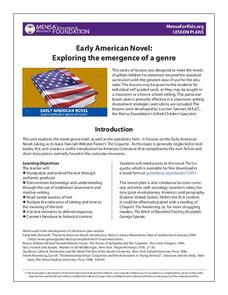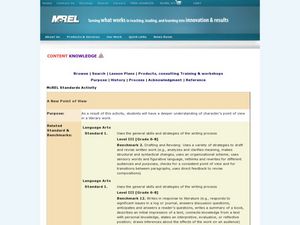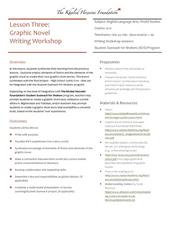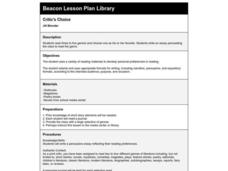Curated OER
Listening to Gather Evidence in a Reading Selection
Fourth graders explore an Ethiopian folktale, "Fire on the Mountain." In this literature lesson, 4th graders evaluate and record the evidence, as well as make predictions about what they think will happen. Students evaluate other groups...
MENSA Education & Research Foundation
Early American Novel: Exploring the Emergence of a Genre
Need an extra challenge for your best readers? Check out a unit that uses Hannah Webster Foster’s epistolary novel, The Coquette, published in 1797, as the anchor text. The resource is packed with project ideas; each with its...
Curated OER
Figurative and literal language through the study of Shakespeare
Sixth graders explore figurative and literal language. They study literary devices through short pieces of Shakespeare's work. Then investigate Shakespeare's works and life.
Curated OER
A New Point of View
Analyze point of view and how it affects a literary work with this lesson. Middle schoolers create a written piece that focuses on point of view. They review the literary term "point of view," and explore examples of the term in text....
Hawaiʻi State Department of Education
Picture Poetry
What a fun idea! The class discusses, and then writes free-verse poems using sensory detail. They get into small collaborative writing teams to compose their poems. Next, they pantomime the actions from the poem while their teammates...
Curated OER
Graphic Novel Writing Workshop
Khaled Hosseini’s video “Using Real People and Events” motivates learners to reflect on their own experiences and to use those experiences as the basis of a graphic novel that expresses a universal truth. The richly detailed plan...
Curated OER
Mystery Lessons
Learn about mysteries with your readers. They will investigate plot, basic elements of mystery, famous characters, and become familiar with genre vocabulary. Bring in props and mystery books to begin and then have learners create story...
Howard Hughes Medical Institute
The Making of the Fittest: Got Lactase? The Co-evolution of Genes and Culture
Got milk? Only two cultures have had it long enough to develop the tolerance of lactose as an adult. Learn how the responsible genes evolved along with the cultures that have been consuming milk. This rich film is supplied with a few...
Curated OER
Die Weisse Rose: German History
Students conduct research on a German anti-Nazi group named "Die Weisse Rose", the White Rose, that eventually lost their lives for their resistance to Nazi rule. They view films, access the Internet, prepare responsive narratives to the...
Curated OER
Ant Writing
Students become effective writers. They need to practice strategies for working through the writing process. By presenting the students with a creative problem, they must choose a position and support it accordingly.
Curated OER
Lunar Myths
Fourth graders explore the phases of the moon. In this moon lesson, 4th graders research myths regarding the moon and create a PowerPoint presentation to share their findings.
Curated OER
A Picture's Worth 500-700 Words
Students write a narrative or short story of 500-700 words based on an assigned work of art.
John F. Kennedy Center
Folktale Theatre
Introduce your middle schoolers to a performance and movement activity that uses their favorite stories from fairytales and folklore. They practice basic acting skills, create dialogues with a partner, and then as guided practice,...
Curated OER
"In a Grove" and "Rashomon" by Akutagawa
Students read and analyze the short stories, "In a Grove," and "Rashomon," by Akutagawa. They discuss the samurai warrior culture, watch a short video, take a quiz, participate in whole-group discussions, identify similes and metaphors,...
Curated OER
Critic's Choice
Third graders read three to five genres and choose one as a favorite. They write an essay persuading the class to read the genre. This lesson plan serves as a nice introduction to different styles of literature.
Curated OER
Sato and the Elephants
Students write a persuasive letter to the government of an African country that has elephants as a resource. Students research and debate the pros and cons of ivory use. Students identify the value of ivory products versus the lives of...
Curated OER
It's Raining Meatballs
Students observe and demonstrate the process of summarization using the book "Cloudy With a Chance of Meatballs" by Judi Barrett. They silently read the story, and as a class discuss the five W's. Students then write a short summary of...
Curated OER
Debunking the Myth of the American West
Students participate in a close reading. They examine the text closely for implied and hidden meaning, dissect the story to understand the text as a written craft, and discuss significant details and overall meaning of story. They...
Curated OER
Author's Purpose
Sixth graders brainstorm the reasons authors write, and they list their responses on the board. Students discuss each purpose they have listed.Students work independently to read the selection "Tarantulas and Typhoid" by...
Bright Hub Education
The Winter of Our Discontent
The resource gives some basic concepts concerning the title of the novel, basic literary elements, student developed assessments, and a philosophical notion concerning honesty in literature. The instructors are shown where they can...
Curated OER
Dramatizing Your Story
Young scholars write a script, planning and recording improvisations based on personal experience and heritage, imagination, literature and history.
Curated OER
If I Were the Wind
Eighth graders are introduced to authors in the conservation community. As a class, they describe a personal experience they have had with nature. They identify examples of an author's descriptive writing techniques and answer questions...
Curated OER
Dr. Heidegger's Experiment
Examine the idea of perpetual youth and immortality while you read Nathaniel Hawthorne's Dr. Heidegger's Experiment. Some links work to direct your learners to information about the Fountain of Youth. Using this information, scholars...
Curated OER
Narrative Writing Outline
Students explore the elements of a narrative for its purpose, type of audience, mood, main character, minor characters, setting, and conflicts in the story. A story outline is developed and a five paragraph essay composed in this lesson.























